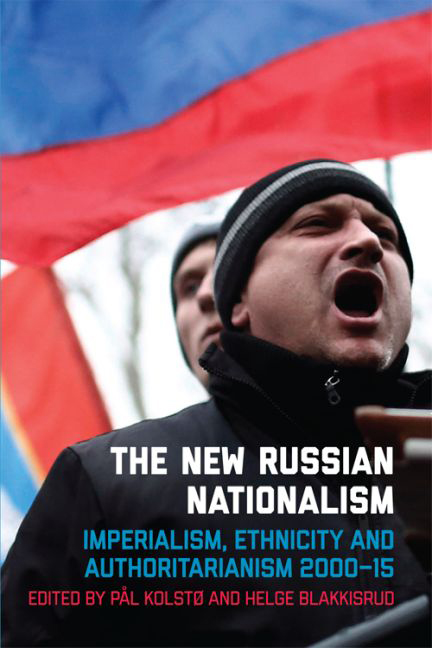Book contents
- Frontmatter
- Contents
- List of Figures
- List of Tables
- Acknowledgements
- Notes on Contributors
- Introduction: Russian nationalism is back – but precisely what does that mean?
- 1 The ethnification of Russian nationalism
- 2 The imperial syndrome and its influence on Russian nationalism
- 3 Radical nationalists from the start of Medvedev's presidency to the war in Donbas: True till death?
- 4 Russian ethnic nationalism and religion today
- 5 Everyday nationalism in Russia in European context: Moscow residents’ perceptions of ethnic minority migrants and migration
- 6 Backing the USSR 2.0: Russia's ethnic minorities and expansionist ethnic Russian nationalism
- 7 Rallying ’round the leader more than the flag: Changes in Russian nationalist public opinion 2013–14
- 8 How nationalism and machine politics mix in Russia
- 9 Blurring the boundary between civic and ethnic: The Kremlin's new approach to national identity under Putin's third term
- 10 Russia as an anti-liberal European civilisation
- 11 Ethnicity and nationhood on Russian state-aligned television: Contextualising geopolitical crisis
- 12 The place of economics in Russian national identity debates
- Bibliography
- Index
11 - Ethnicity and nationhood on Russian state-aligned television: Contextualising geopolitical crisis
- Frontmatter
- Contents
- List of Figures
- List of Tables
- Acknowledgements
- Notes on Contributors
- Introduction: Russian nationalism is back – but precisely what does that mean?
- 1 The ethnification of Russian nationalism
- 2 The imperial syndrome and its influence on Russian nationalism
- 3 Radical nationalists from the start of Medvedev's presidency to the war in Donbas: True till death?
- 4 Russian ethnic nationalism and religion today
- 5 Everyday nationalism in Russia in European context: Moscow residents’ perceptions of ethnic minority migrants and migration
- 6 Backing the USSR 2.0: Russia's ethnic minorities and expansionist ethnic Russian nationalism
- 7 Rallying ’round the leader more than the flag: Changes in Russian nationalist public opinion 2013–14
- 8 How nationalism and machine politics mix in Russia
- 9 Blurring the boundary between civic and ethnic: The Kremlin's new approach to national identity under Putin's third term
- 10 Russia as an anti-liberal European civilisation
- 11 Ethnicity and nationhood on Russian state-aligned television: Contextualising geopolitical crisis
- 12 The place of economics in Russian national identity debates
- Bibliography
- Index
Summary
This chapter explores Russian state-aligned television's approaches to representing ethnicity and nationhood in its news broadcasts, considering the medium's effectiveness as a tool for forging a sense of belonging among the citizens of the Russian Federation. The material on which it is based largely precedes the 2014 political crisis around Ukraine. But that material, and our reading of it, is framed by the crisis and by Russian federal television's role in fanning the flames that continue to engulf the actors at its heart. The pertinence and purpose of the points we make are not restricted to the Ukraine context. Their significance relates also to our understanding both of Russian nation-building and of the responsibilities of the media in complex multi-cultural societies more generally. However, central to our argument is the conviction that neither the conflict with the West that Russia's actions in Ukraine precipitated, nor the rationale for those actions promoted in news broadcasts on state-aligned channels, can be understood without reference to tensions within the Putin regime's nation-building project that had long been evident in television news broadcasts, and that we focus on below. While our analysis is primarily historical with respect to the Ukraine crisis, it identifies several factors with a direct bearing on those later events. These have to do with contradictions between different versions of Russian nationalism; concerns regarding a disconnection between official policy on national cohesion and popular sentiment; and ambiguities surrounding the Kremlin's relationship with broad- casters. We summarise their bearing on the Ukraine crisis in our conclusion.
Historically, the media have been central to every nation-building project, as they disseminate particular imaginings of the community, of its shared values and its constitutive ‘others’ (Postill 2006). By selecting certain issues for coverage and by framing news reports in one way or another, the media contribute to building community consensus around particular perceptions (McCombs 1997).
- Type
- Chapter
- Information
- The New Russian NationalismImperialism, Ethnicity and Authoritarianism 2000–2015, pp. 298 - 335Publisher: Edinburgh University PressPrint publication year: 2016



